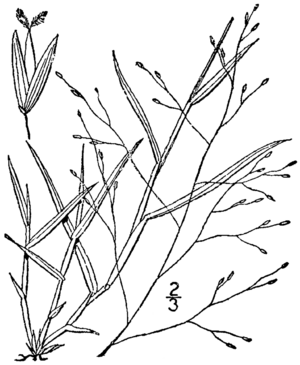Fall witchgrass facts for kids
Quick facts for kids Fall witchgrass |
|
|---|---|
 |
|
| 1913 illustration | |
| Conservation status | |
| Scientific classification |
|
| Kingdom: | Plantae |
| Clade: | Tracheophytes |
| Clade: | Angiosperms |
| Clade: | Monocots |
| Clade: | Commelinids |
| Order: | Poales |
| Family: | Poaceae |
| Genus: | Digitaria |
| Species: |
D. cognata
|
| Binomial name | |
| Digitaria cognata (Schult.) Pilg.
|
|
| Script error: The function "autoWithCaption" does not exist. | |
| Synonyms | |
|
Leptoloma cognatum |
|
Script error: No such module "Check for conflicting parameters".
Digitaria cognata is a type of grass that grows in many places. People call it by different names like fall witchgrass, Carolina crabgrass, or mountain hairgrass. It's a common plant found across North America.
What it Looks Like
This grass is a perennial, meaning it grows back year after year without needing to be replanted. It does not have underground stems (rhizomes) that spread. Instead, its roots stay close to the surface.
The stems of this grass stand straight up and can grow as tall as 56 centimeters (about 22 inches). The bottom parts of the stems are strong and have small hairs. The leaves are thin and can be up to 12.6 centimeters (about 5 inches) long. One side of the leaf often looks wavy, while the other side is smooth.
The flowers of the fall witchgrass grow in a cluster called an inflorescence. This cluster is often purple and shaped like a panicle, which looks a bit like a pyramid. Each small part of the flower cluster is called a spikelet, and it holds a single flower.
How it is Used
Digitaria cognata is helpful for many animals. It provides food for farm animals like cows and sheep, as well as wild hoofed animals such as deer. Birds also enjoy eating the seeds of this grass.
 | Lonnie Johnson |
 | Granville Woods |
 | Lewis Howard Latimer |
 | James West |


